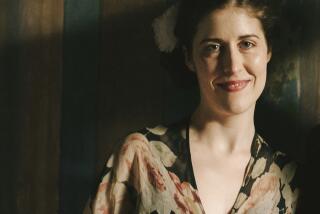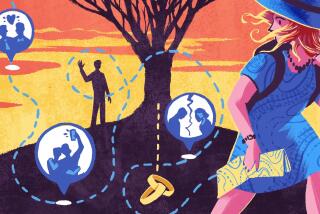Review: Kate Atkinson moves backwards through a life in âA God in Ruinsâ
About 50 pages into âA God in Ruins,â I got confused. As the book picked up momentum, it was throwing Teddy Todd, a World War II pilot, 40 years ahead to a full life of parenthood and grandparenthood. But hadnât Teddy died during the war in Kate Atkinsonâs last novel, âLife After Lifeâ?
Indeed he did. But he also did not. âLife After Life,â a charming and innovative 2013 bestseller, told the story of Ursula Todd, a Greatest Generation Brit who expired again and again (and again and again), each time being reborn into the same life where she just might, with the right combination of luck and pluck, get a chance to take a shot at Hitler.
Teddy was Ursulaâs younger brother, and his death, coming near the end of the book, was heartbreaking. He was the perfect little brother, precocious and curious and sweet, and Atkinson seems not quite able to let him go. In a later thread in that book, she allowed him to survive his fiery plane crash, and he is at the center of âA God in Ruins,â which she calls not a sequel to the previous book but its companion.
You donât have to read âLife After Lifeâ to get âA God in Ruins,â and sadly, the new book doesnât live up to the promise of its predecessor. The first novelâs innovative structure made it exciting, but its true charm was in the rich family life drawn by Atkinson (with no shortage of morbid wit), counterbalanced by harrowing scenes of London during the Blitz. Readers fell for Ursula and Teddy and the rest of their siblings; their glamorous, kooky aunt; their parents and neighbors; for Ursulaâs lovers and friends.
Teddy is surrounded by far less appealing characters in âA God in Ruins,â particularly in the first half of the book. Thatâs when weâre mostly learning about late-life Teddy, an aging grandparent whose past emerges in memory and reverie. âThe dead were legion and remembrance was a kind of duty, he supposed. Not always related to love.â
After the war, Teddy wed his childhood sweetheart, but the marriage, which appeared solid, lacked passion. Itâs one of the many disappointments he suffers (silently, stoically). He winds up raising their daughter, Viola, on his own; she is unpleasant as a child and a singularly selfish adult. When not neglecting her children, Viola is openly hostile to them. Sunny, her son, is a chronic failure; miraculously, her daughter, Bertie, grows up all right. The attentive, kind relationship between Bertie and her grandfather Teddy provides the book with much-needed warmth.
In the first half of the book, Teddyâs life is diminished â geographically, from a country house to an anodyne duplex in York to a grim assisted-living facility; technologically, from flying warplanes to being unable to figure out how to use a cellphone; socially, having lost his intimates, siblings, lovers and friends. Although Teddy keeps a stiff upper lip as his generation was bred to, it is a desolate state of being and not much fun in terms of a fiction to live in.
The bookâs backward arc moves from Teddyâs late life to his youth in the Royal Air Force. This structure isnât surprising, as âLife After Lifeâsâ was, but Atkinson seems to have carefully tended to it so that the most meaningful details are withheld for much of the text; we often encounter fragments whose significance doesnât emerge until very late in the story.
In one instance, as Teddyâs grandson is helping to pack his grandfather up to move to an assisted-living facility, Sunny discovers a box of medals from the war. It will be hundreds of pages before we learn what Teddy had done to earn those medals and what they mean to him. This might seem a juicy tease, but, lacking context, it winds up draining the narrative of feeling.
The blankness of the early chapters may be a deliberate exercise in a novel exploring the erasure of time. âNo one now but Teddy would ever know that once he and Nancy had huddled by the great Aga in the kitchen while the wind blew up the hill and the whistled through every room, competing with Beniamino Gigli and Maria Caniglia singing Tosca on their cherished gramophoneâŚ.â he thinks sadly. âIt would all die with him, he realizedâŚ.â
All the emotion of the novel has pooled at the end, where the significant moments of Teddyâs life tumble out in a cascade: We see the end of his marriage and join him on bombing runs over Europe. Visceral and deeply researched, the passages in the planes show Atkinson at her finest.
These beautifully wrought, deeply felt scenes give meaning to what came before, but with the inverted narrative, arrive too late â not for Teddy, perhaps, but for the reader.
A God in Ruins
A Novel
Kate Atkinson
Little, Brown: 480 pp., $28
More to Read
Sign up for our Book Club newsletter
Get the latest news, events and more from the Los Angeles Times Book Club, and help us get L.A. reading and talking.
You may occasionally receive promotional content from the Los Angeles Times.









